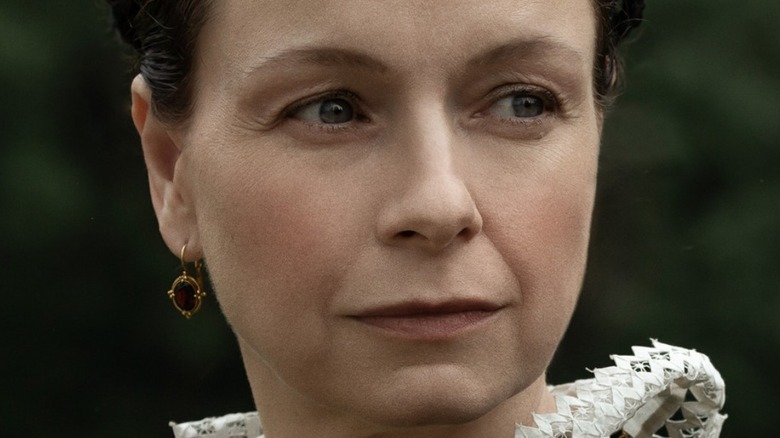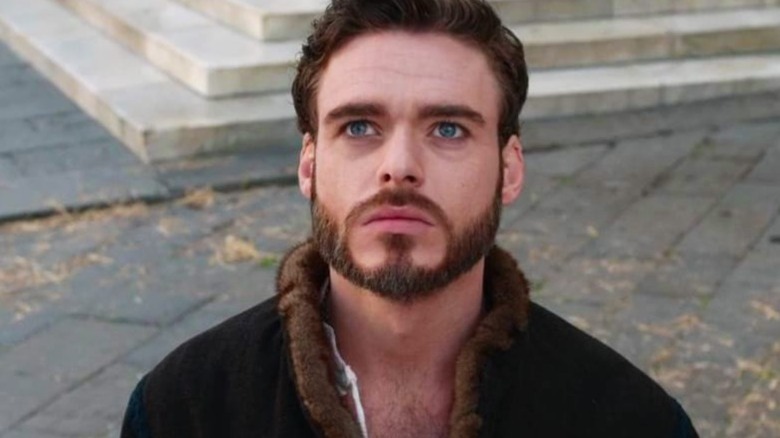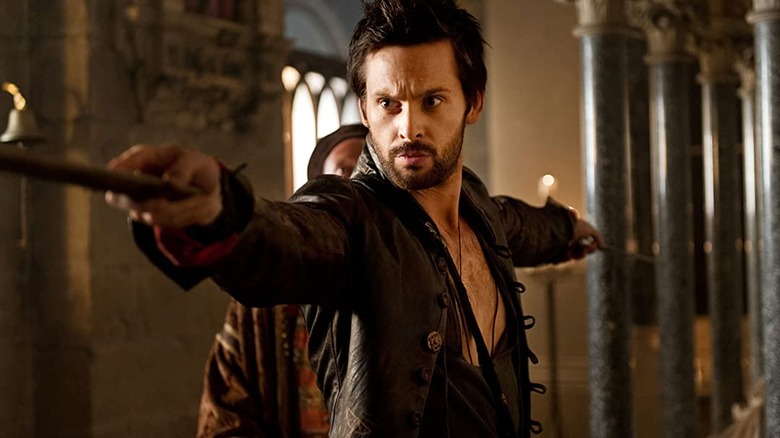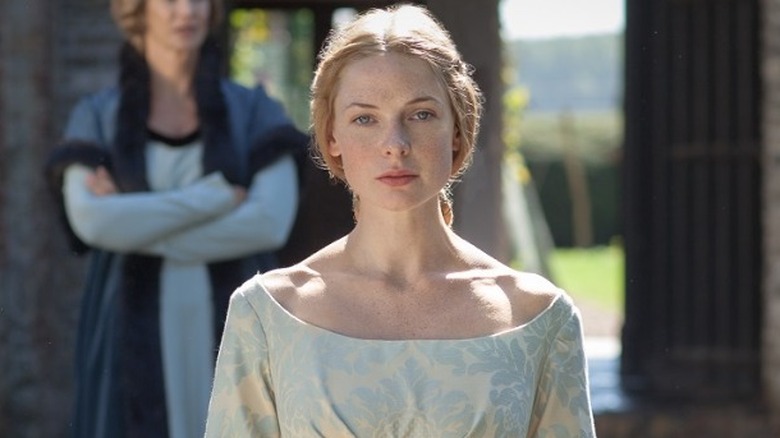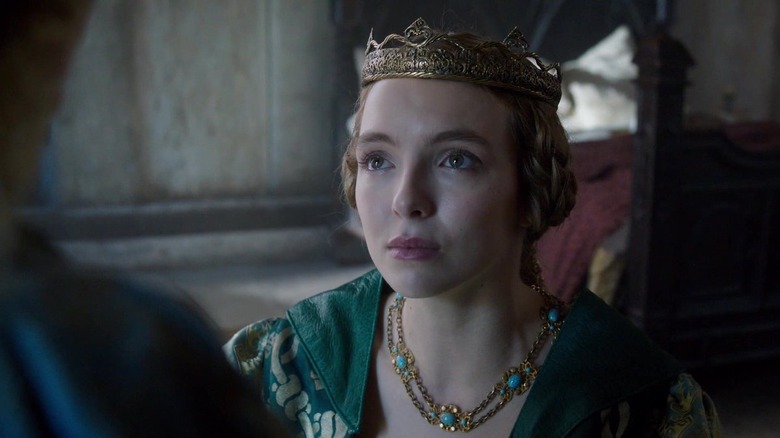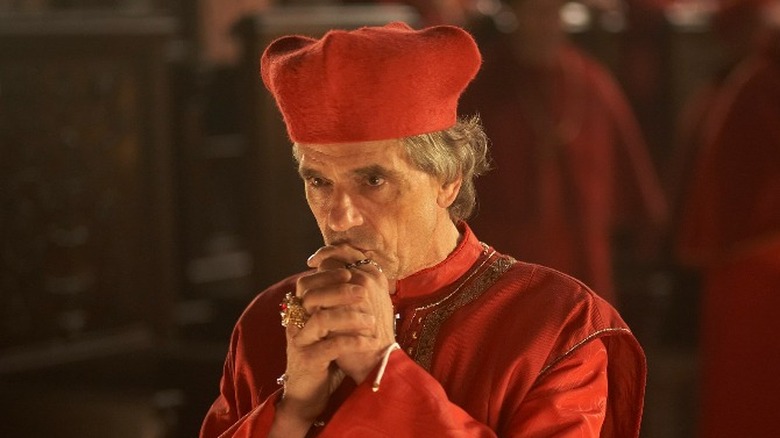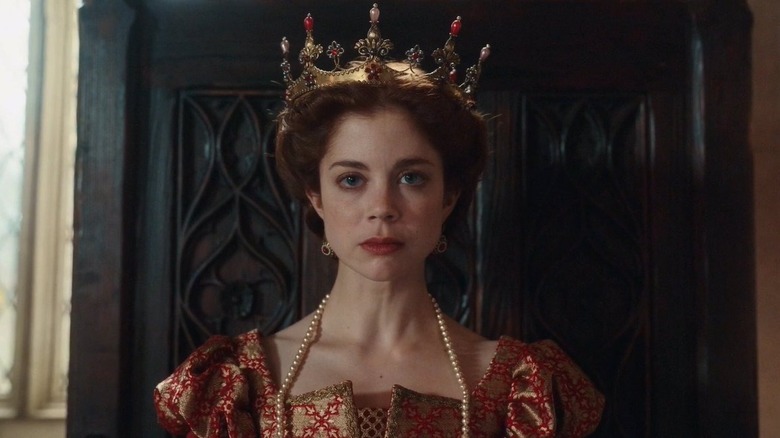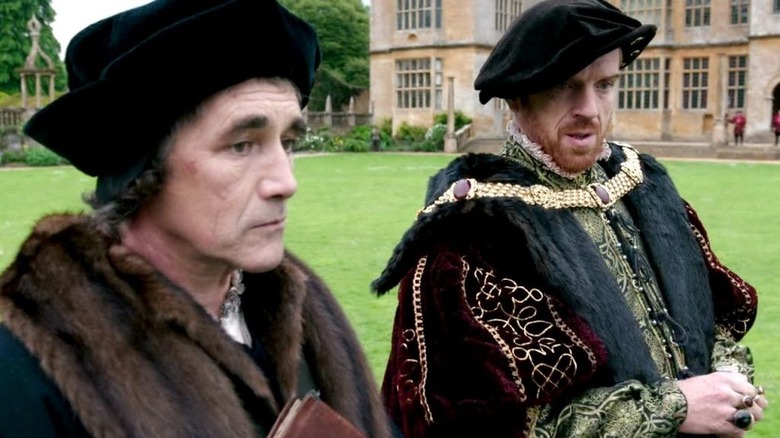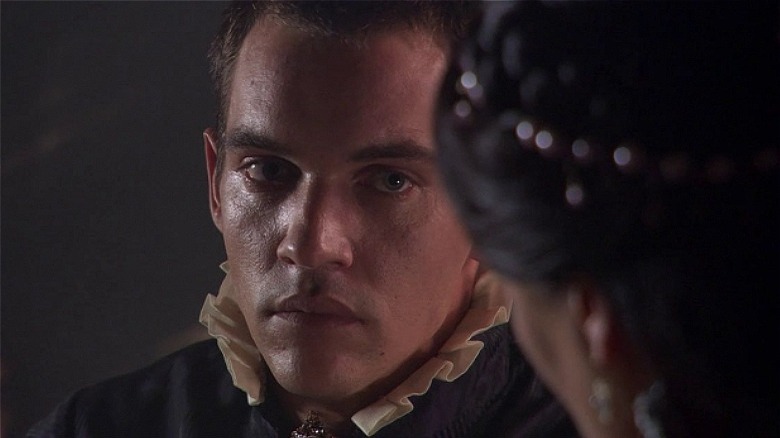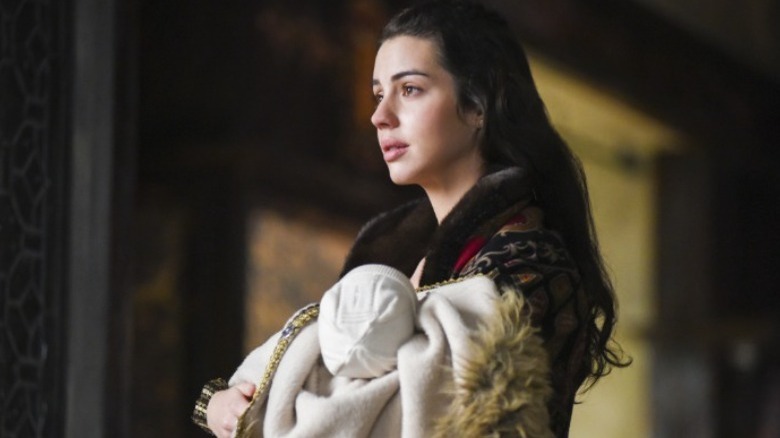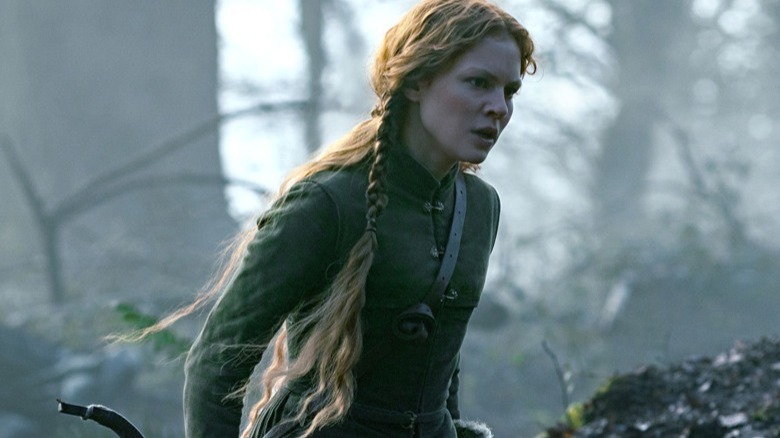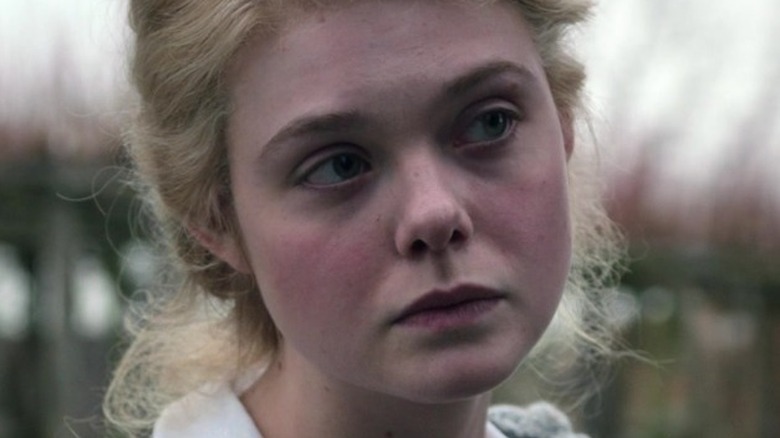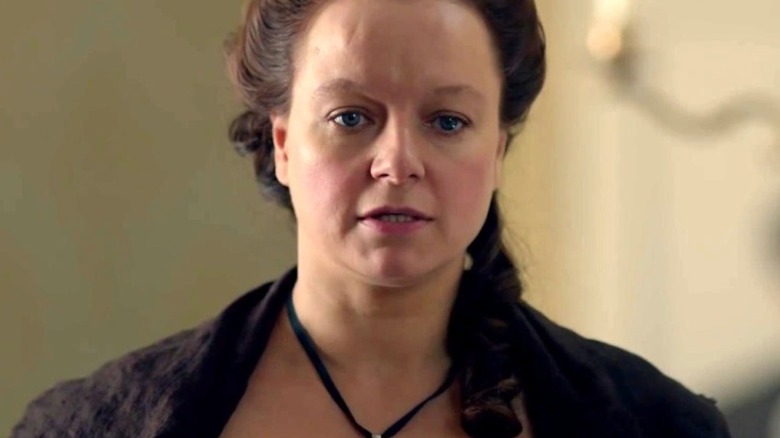12 Best Shows Like The Serpent Queen You Should Check Out
Perhaps it has something to do with the fact that men were doing most of the writing back then, but history is full of unfairly maligned women, from Anne Boleyn and Marie Antoinette to the Ancient Egyptian queen Cleopatra. One of the worst cases is that of Catherine de Medici, whose reputation as a Machiavellian mover in the French court has only been further calcified by the hands of time. Starring Samantha Morton at her wicked best, "The Serpent Queen" is a darkly comedic and empowering twist on the Medici mythos told from the perspective of an orphan left to fend for herself as a teenage bride in the dangerous French court.
Retelling her story to her new maid, Catherine paints a world ruled by men who interminably underestimate, abuse, discard, and even behead their wives — a world in which Machiavellian is the only sensible thing for a woman to be. If you can't get enough of the political intrigue and decadent historical attire that the show serves up, here are 12 more great shows like "The Serpent Queen" you should check out.
Medici
Banking might seem like a pretty mundane line of work, but in the 15th century, it was downright harrowing. Chronicling different generations of the wealthy and influential Medici clan, "Medici" explores the family's rise to power and its influence on the Italian Renaissance.
Season 1 follows the political rise of the wealthy Medici family under Giovanni de Medici (Dustin Hoffman) and his successor Cosimo de Medici (Richard Madden). The latter divides his time between warding off assassination attempts and transforming Florence into a center for the arts and humanities, with accomplishments that include funding Brunelleschi's Dome, building the Laurentian Library, and providing patronage to artists like Donatello.
Season 2 and Season 3 follow the family line via Cosimo's grandson Lorenzo de Medici (Daniel Sharman), known to Florence as Lorenzo the Magnificent. Lorenzo epitomized the Renaissance Man. The story recounts his youthful ascension to the head of the family and his establishment of the Medicis as the de facto rulers of Florence.
Aided by a beautifully triumphant score and a solid cast, "Medici" pays tribute to a family that somehow managed to live in three times at once — looking to the ancients who built Greece and Rome, managing contemporary political in-fighting, and changing Europe forever with generational thinking. Plenty of Richard Madden's "Game of Thrones" co-stars appear, with Sean Bean, Stuart Martin, Jack Roth, and David Bradley all popping up.
Da Vinci's Demons
"Da Vinci's Demons" is a historical fantasy series that explores a young Leonardo Da Vinci's career and his interactions with the Medici family. The show is beautifully scored by Bear McCreary, the award-winning composer whose work includes "Battlestar Galactica," "Outlander," "The Lord of the Rings: The Rings of Power," and "The Walking Dead." The series imagines the man who was arguably one of the most brilliant minds to ever live in the bustling, chaotic city of 15th-century Florence. The result is a spicy period drama gumbo seasoned with the spirit of "The Da Vinci Code," "Reign," and even "Xena: Warrior Princess."
While it's hardly a good source for accurate historical information, "Da Vinci's Demons" takes genre lovers on a wild ride that touches on real people and places them in a version of the Italian Renaissance full of anachronisms. Like "Medici," the Pazzi versus Medici feud and ensuing Pazzi Conspiracy plays a key role in the story. English actor Tom Riley, who is perhaps best known for his turn as Augustus "Augie" Bidlow in HBO's sci-fi drama "The Nevers," puts in a great performance as the titular artist, embracing the swashbuckling side of the show. "There is a bit of the fantastical about it, but I really like high-concept stuff when it's done well and with a gigantic imagination," Riley told The Independent.
The White Queen
"The White Queen" is the first in a series of historical dramas based on Philippa Gregory's "The Cousins' War" novel series, which fictionalizes the lives of several key women at the center of the Wars of the Roses and the eventual ascension of the Tudor line to the English throne. The events of the series revolve around protagonist Elizabeth Woodville (Rebecca Ferguson, who went on to play Jessica Atreides in "Dune") and begin in 1464 with Edward IV's defeat of the resistance. For those not familiar with the history, Richard "The Kingmaker" Neville, Earl of Warwick (James Frain), helped Yorkist hopeful Edward depose Henry VI and take the crown.
The story begins with Edward (Max Irons), fresh from the battlefield, encountering Elizabeth under a tree. The widow hopes to petition him to have the lands of her children restored after her husband died supporting the Lancastrian cause. Edward becomes instantly smitten with her, despite her low status as a minor noble, and they marry. Thus begins the rise of the Woodvilles in the royal court, something Warwick is not too happy about. It's not going to help anyone pass their English history test, but the series does a good job of capturing the overall War of the Roses drama and works well as a steamy, dreamy escape for anyone who enjoys a good swords-and-armor romance.
The White Princess
"The White Princess" picks up after the events of "The White Queen" with the story of Dowager Queen Elizabeth Woodville's daughter, Elizabeth of York (Jodie Comer). The story begins in 1485, two days after the battlefield death of King Richard III of "My kingdom for a horse" fame. With the war between the families in full swing again and King Henry VII freshly installed on the throne, a marriage between Elizabeth ("Lizzie") and the Tudor King — a Lancaster — is meant to create an alliance between the two sides and secure his royal claim. Unlike her mother, who entered into a romance with King Edward on her own terms, Lizzie is forced into the marriage, despite having been in love with the late King Richard.
Despite the antagonistic relationship between the pair, Lizzie comes into her own as queen while learning to play the chess game of court life. Like the other dramas in the series, the show plays around with real history as it suits the storytelling. Comer, who is best known for her Emmy-winning performance as Villanelle in "Killing Eve," is stellar as Elizabeth of York, and there are plenty of great supporting performances. Essie Davis ("The Babadook") and Michelle Fairley (Catelyn Stark from "Game of Thrones") are both highlights of this tense political period drama.
The Borgias
Like "Medici," "The Borgias" recounts the tale of a powerful Italian Renaissance family. It begins in 1492, when all the powerful European families had a vested interest in who the Pope was because of his authority to determine what — and who — was appointed by God, making him the only person on Earth with authority over kings. Set in Rome, the series chronicles the ascension of the Italian-Spanish House of Borgia to the papacy and follows their interactions with other powerful Italian families, including the Medici.
The story opens on Rodrigo Borgia (Academy Award winner Jeremy Irons) as he bribes, connives, and outright buys his way into becoming Pope Alexander VI. Like "Medici," the world of "The Borgias" is one of shifting alliances and cutthroat politicking — and we mean that quite literally. The series boasts plenty of sumptuous Italian Renaissance costumes, which earned the show two Emmy Awards in 2011 and 2013. The series also picked up the Emmy for outstanding title music in 2011. However, the best thing about this gripping series is the performance of Jeremy Irons, who is at his chilling best in his portrayal of one of history's most controversial religious figures.
The Spanish Princess
Based on Philippa Gregory's Catherine of Aragon novels, "The Spanish Princess" follows "The White Queen" and "The White Princess," detailing the reign of the eponymous princess and later queen who would become the first of Henry VIII's wives. The series begins in 1501 with the mutually beneficial marriage-by-proxy of the young Spanish princess Catherine to the English prince Arthur Tudor, the son and heir of Henry VII. They are matched out of desperation on both sides, with Spain in need of Catholic allies in Europe and England desperately in need of Spanish funds.
After her new husband unexpectedly dies, her future — as well as that of her country — is on shaky ground. Devoted to her faith and in the shadow of her formidable mother, she is determined to fulfill her destiny by marrying Arthur's brother and bearing him an heir. The series spans the 24-year period leading up to Henry meeting Anne Boleyn, who would become his second wife. This beautifully-crafted two-season story is a fitting tribute to the woman Henry VIII would so callously toss aside after becoming infatuated with another woman.
Wolf Hall
A six-episode series based on Dame Hilary Mantel's historical novels "Wolf Hall" and "Bring Up the Bodies," this series begins in 1529 during the reign of Henry Tudor. With no male heirs to show for his 20 years of marriage to Catherine of Aragon, the king fears for his line and legitimacy. Years into his relationship with Anne Boleyn, he has grown tired of petitioning the Pope for an annulment from his first wife. The story focuses on the meteoric political ascension of Thomas Cromwell (the driving force behind the king's controversial annulment and the English Reformation) and his ultimate demise at the hand of Henry's executioner.
With a perfectly-cast Damian Lewis ("Homeland") as the mercurial King Henry, and the endlessly talented Mark Rylance ("Bridge of Spies") as Thomas Cromwell, "Wolf Hall" offers a claustrophobic examination of the intense political struggles that surrounded Henry's reign. He's shown to be a volatile king who would easily turn on friends and lovers alike with the right words whispered in his ear. For history buffs who prefer intrigue over soapier storytelling, this critically-acclaimed series (it has a near-perfect score of 98% on Rotten Tomatoes) will surely hit the spot.
The Tudors
Easily one of the sexiest historical dramas ever made, "The Tudors" stars Jonathan Rhys Meyers as an inexplicably brunette King Henry VIII — the famous monarch was known to have been a redhead. From creator Michael Hirst (who would go on to make another epic historical series in "Vikings"), "The Tudors" details Henry's life with — and the generally unfortunate fates of — his six wives. The series begins with Henry's rejection of his first wife, Catherine of Aragon (Maria Doyle Kennedy), after her so-called failure to bear him a son leaves him in fear for his crown. It details the king's willingness to upend his entire nation in pursuit of freedom from the papacy after the Pope refuses to grant his annulment so he can marry Anne Boleyn.
Meyers' intense portrayal of the infamously volatile king jumps from sensually charming to utterly unhinged so frequently that it's hard to understand how anyone could ever willingly remain in the English court with the crown on Henry Tudor's head. The outstanding cast includes Sam Neill, Peter O'Toole, James Frain, Joss Stone, and future Superman actor Henry Cavill. "Game of Thrones" star Natalie Dormer plays the role of Anne Boleyn, and she's more than a match for Meyers — the pair take part in several electric scenes. Anyone who has struggled to keep the wives of Henry VIII straight will find this a satisfying (and shamelessly sexy) primer.
Reign
Long before Mary, Queen of Scots found herself at the business end of an executioner's ax, she spent years growing up in the French court after she was betrothed to the young Dauphin Francis II at only six years old. A YA story developed for The CW, "Reign" is a fictionalized account of the years leading up to and immediately after this marriage. Like some of the other shows on this list, "Reign" doesn't strive for historical accuracy, instead relishing in the pure pleasure of a soapy, fantasy-infused period drama that has more in common with fan fiction than a PBS or BBC drama.
Rather than use period-perfect costumes, the production draws on Renaissance influences, utilizing contemporary clothing that looks a bit like cosplay — in all the best ways. It's a surprisingly moreish story for anyone who enjoys the pure escapism of historical dramas, and outstanding performances from actors like Adelaide Kane (Mary) and Alan van Sprang (King Henry II) are the icing on the cake. Megan Follows of "Anne of Green Gables" fame plays the deliciously cutthroat and complicated Queen Catherine de Medici with the same power and command Samantha Morton brings to her role in "The Serpent Queen."
Becoming Elizabeth
Fans of historical dramas will no doubt be familiar with "Elizabeth" and "Elizabeth: The Golden Age," starring Cate Blanchett and featuring a young Samantha Morton. Like most productions centered around Elizabeth Tudor, they begin just before the young queen's ascension to the throne in 1558. "Becoming Elizabeth" chronicles the often overlooked period prior to her coronation when the young princess faced an uncertain future as the daughter of Henry VIII and Anne Boleyn. She was declared illegitimate by the Pope, who wanted England's oppressed Catholics to rise up against her.
The story recounts her life as a technically orphaned teenager living in the home of her father's last wife Catherine Parr, a shrewd woman whose influence helped Elizabeth and her sister Mary get restored to the line of succession with the Third Succession Act. The series soundly depicts the danger this young girl faced and the internal strength she had to muster as she transformed herself from an illegitimate orphan to the beloved Virgin Queen that would bring four and a half decades of relative stability to England.
The Great
"The Great" may be set a few hundred years after "The Serpent Queen," but Catherine de Medici and Catherine the Great are certainly cut from the same cloth. Like the Medici queen, Princess Sophie of Anhalt-Zerbst — who would later be renamed Catherine upon joining the Russian Orthodox Church — was married to someone she did not know for someone else's political gain. Starring Elle Fanning as Catherine, "The Great" recounts how the Enlightenment queen won the favor of her people and the loyalty of her military, both of which she would use to overthrow her husband.
Brimming with gorgeous 18th-century costumes, the story is told as a satirical dark comedy that aims to capture the spirit of the queen and the age in which she lived through a modern lens. With an impressive 94% Rotten Tomatoes rating and a memorable turn from Gillian Anderson as Catherine's mother Joanna, this wild jape of a tale is short on historical accuracy but full of fun moments. "Every scene, every line of Tony McNamara's script carries its own wicked hedonism," said The Guardian in its five-star review. "There is always something to enjoy that's ruder, sillier or sharper than other shows would dare to include."
Harlots
Set in 1760s London and inspired by an 18th-century directory of London sex workers called "Harris's List of Covent Garden Ladies," "Harlots" is centered on a feud between two rival brothel owners. Samantha Morton stars as madam and brothel owner Margaret Wells, whose efforts to elevate her business and her status put her at odds with Lydia Quigley (Lesley Manville) of the ritzy Greek Street. Like her portrayal of Alpha in "The Walking Dead," Morton's character in "Harlots" is forced to balance her need for power and control with her desire to protect her children, an act that leaves little room for warmth and nurturing.
Jessica Brown Findlay ("Victor Frankenstein" ) is outstanding as her daughter Charlotte. Her skill, along with her mother's shrewdness, earns her a place as one of the city's most renowned courtesans. The show's well-deserved 97% Rotten Tomatoes score, the female-driven Machiavellianism, and the candy-colored Georgian-era finery are just three more reasons this series should be on every historical drama lover's watch list.
